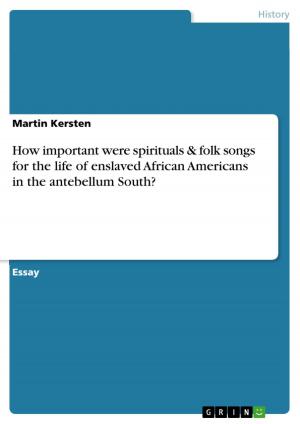Poetic Justice in William Faulkner's 'Absalom Absalom'
Fiction & Literature, Literary Theory & Criticism, British| Author: | Manuela Gertz | ISBN: | 9783640660780 |
| Publisher: | GRIN Publishing | Publication: | July 13, 2010 |
| Imprint: | GRIN Publishing | Language: | English |
| Author: | Manuela Gertz |
| ISBN: | 9783640660780 |
| Publisher: | GRIN Publishing |
| Publication: | July 13, 2010 |
| Imprint: | GRIN Publishing |
| Language: | English |
Seminar paper from the year 2010 in the subject English - Literature, Works, grade: 2,5, University of Stuttgart, course: William Faulkner, language: English, abstract: In his novel 'Absalom, Absalom!' William Faulkner recounts the story of Thomas Sutpen, a pioneer who tries to establish his family dynasty in the Southern aristocratic plantation society in Mississippi. Thomas Sutpen rigorously pursues his design at all costs, not considering the possible consequences. This moral flaw in his character causes the downfall of his dynasty and the destruction of the whole family. At the end of the novel Sutpen's Hundred, the decaying mansion Sutpen built to accomplish his design, is burned down, together with the last descendants of the family. This tragic development of the story provokes the idea of poetic justice, where virtue is rewarded and vice is punished. But can such a sharp categorization really be applied on this complex novel? In the following paper I will show whether the term poetic justice can be applied on 'Absalom, Absalom!'. I will take a look at the elements which might support this assumption by considering the characters' development and function in the novel in order to show if they support the idea of punishment or reward. However, first of all I will take a closer look at the term poetic justice in general. I will give a definition, view its origins and examine its use in historical and recent context before applying it on Faulkner's novel 'Absalom, Absalom!'.
Seminar paper from the year 2010 in the subject English - Literature, Works, grade: 2,5, University of Stuttgart, course: William Faulkner, language: English, abstract: In his novel 'Absalom, Absalom!' William Faulkner recounts the story of Thomas Sutpen, a pioneer who tries to establish his family dynasty in the Southern aristocratic plantation society in Mississippi. Thomas Sutpen rigorously pursues his design at all costs, not considering the possible consequences. This moral flaw in his character causes the downfall of his dynasty and the destruction of the whole family. At the end of the novel Sutpen's Hundred, the decaying mansion Sutpen built to accomplish his design, is burned down, together with the last descendants of the family. This tragic development of the story provokes the idea of poetic justice, where virtue is rewarded and vice is punished. But can such a sharp categorization really be applied on this complex novel? In the following paper I will show whether the term poetic justice can be applied on 'Absalom, Absalom!'. I will take a look at the elements which might support this assumption by considering the characters' development and function in the novel in order to show if they support the idea of punishment or reward. However, first of all I will take a closer look at the term poetic justice in general. I will give a definition, view its origins and examine its use in historical and recent context before applying it on Faulkner's novel 'Absalom, Absalom!'.















